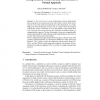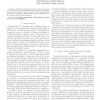2024 search results - page 50 / 405 » A Formal Model of Multi-agent Computations |
117
click to vote
JOC
2007
14 years 11 months ago
2007
Signcryption is a public key or asymmetric cryptographic method that provides simultaneously both message confidentiality and unforgeability at a lower computational and communica...
93
Voted
IPPS
1999
IEEE
15 years 3 months ago
1999
IEEE
This paper formalizes the concept of Collective Intelligence (C-I). Application of the Random PROLOG Processor (RPP) has allowed us to model the phenomenon of C-I in social structu...
FATES
2004
Springer
15 years 4 months ago
2004
Springer
A Time Action Lock is a state of a Real-time system at which neither time can progress nor an action can occur. Time Action Locks are often seen as signs of errors in the model or ...
104
click to vote
LOGCOM
2008
14 years 11 months ago
2008
We investigate mathematical modelling with theories of data types. We provide a formal setting for the formulation of such theories (TPL) and use it to introduce the notion of a c...
ICNS
2006
IEEE
15 years 5 months ago
2006
IEEE
Abstract— The theory of promises describes policy governed services, in a framework of completely autonomous agents, which assist one another by voluntary cooperation alone. We p...


